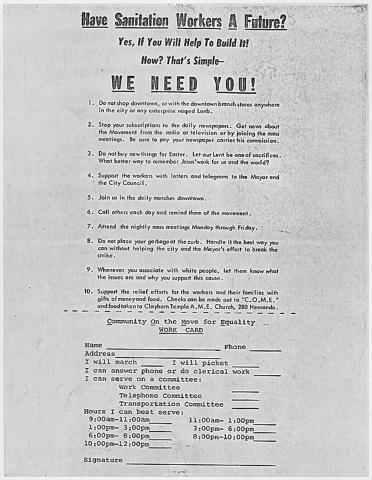
Description
This flyer was distributed to the striking sanitation workers in Memphis, Tennessee, requesting volunteer assistance and offering instructions for sanitation workers and their sympathizers. The first attempted strike failed to lead to better working conditions or pay because of a lack of backing by key players in the community. In what would be his final campaign focusing on economic justice, Dr. Martin Luther King, Jr., traveled to Memphis in support of the sanitation workers of the city and American Federation of State, County and Municipal Employees (AFSCME). The strike that began in February of 1968 was different in that its catalyst was after the deaths of sanitation workers, Echol Cole and Robert Walker. Both men were African American and were prohibited from riding inside the cab of the garbage truck because of discriminatory Jim Crow laws. Because of the severe rainstorm and being denied access to the cab, both men climbed inside the packer of the truck to stay out of the storm during their route. Due to a malfunction of the truck though, they were both crushed to death inside the compactor.
Given the inadequate response to their deaths by the city, the history of abuses of African-American workers, such as not paying overtime or taking malfunctioning trucks out of service, 1,300 workers began a strike. The protestors would be met with violence, and at one point, Memphis Mayor Henry Loeb called for martial law. Finally, on April 16, and following the assassination of Dr. Martin Luther King, Jr., on April 4, negotiations were finalized, recognizing the legitimacy of the union and for better wages. However, months later, workers would have to threaten to strike again because of the city's waning commitment to their agreement.
Transcript of Flyer for Striking Sanitation Workers
Source-Dependent Questions
- Consider request number 9. Why was it necessary given the historical context for protestors to specifically address the issues of this cause with white people?
- Why was a boycott of businesses needed in this protest?
Citation Information
"Exhibit 2 in City of Memphis vs. Martin Luther King, Jr," 1968. Courtesy of National Archives